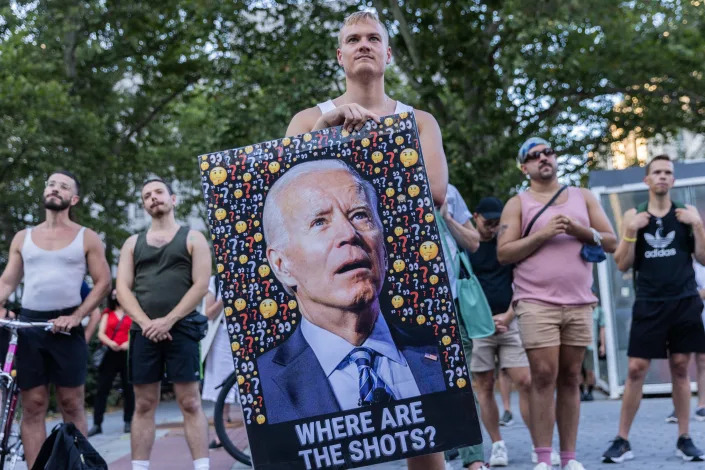Lisa Gutierrez
Thu, August 4, 2022
That Friday in June when the Supreme Court overturned Roe v. Wade threw Dr. Sabrina Markese into an emotional tailspin.
She was supposed to go to dinner with her mom and stepfather the next day. But the idea of breaking bread with staunch Catholics who oppose abortion was a bridge too far. She canceled and spent the day in bed.
Most physicians never speak publicly about abortion outside of putting their name on a list of supporters — both for and against.
Markese never thought she’d have to make her private, pro-choice stance known because, well, Roe v. Wade was there.
But now it wasn’t.
So after a day of crying in bed, after nearly 30 years as a family physician in Kansas, a career that began in Wyandotte County, Markese decided it was time to speak her mind publicly, to join the effort to reject an amendment to the state constitution that would have removed the right to abortion.
“I’ve never really been so outspoken as I am now,” said Markese, who lives in Olathe.
Markese thought Tuesday’s vote would be very close. But she was very wrong. Kansans resoundingly, many say shockingly, made it loud and clear that a woman should have the right to choose. The overwhelming voter turnout and lopsided, 59% share of the votes was thanks, in part, to newly minted activists like Markese.
For Markese, the election wasn’t about abortion. It was about her passionate belief in human rights. That patients should be able to make decisions about their own health care. That they should be able to do that in private.
“I have to support the woman’s right to her bodily autonomy,” Markese told The Star. “This is not so much about abortion as it is about health care. This is about health care and privacy way more than it is about abortion.”
So, in the language of sports, Markese left it all on the field in this fight.
She schooled herself on the amendment proposal, engaged in Facebook conversations — many heated ones with Catholic family members — placed Vote No signs again and again in high-traffic spots in Johnson County, and, in oppressive heat at the Wyandotte County Fair, handed out signs and stickers.
She tweeted. She marched at rallies in Wichita and Topeka with hundreds of other people, stood with them on the steps of the state Capitol in Topeka in solidarity.
She also publicly revealed a secret that only her mother knew, personal history that bolstered her belief that patients should have the right to decide what happens to their body without intervention from politicians, or a church.

Dr. Sabrina Markese of Olathe walked in “vote no” rallies in Topeka and Wichita, shown here, as she let her pro-choice stance on abortion be known publicly for the first time.
A ‘pro-choice’ Catholic
Markese was born and raised in Kansas City and went to medical school in the Midwest. She grew up in a devout Catholic home. Mass every Sunday. Rosaries. Crucifixes. Believing in the Immaculate Conception of the Blessed Virgin Mary.
As a “poor medical student” in Kansas City she couldn’t afford to tithe, so she volunteered as a lector at Redemptorist Catholic Church, reading Scripture at Masses.
Nationally, 76% of U.S. Catholics say abortion should be legal in certain cases, according to a Pew Research Center survey released in May.
Just 1 in 10 said abortion should be illegal always, no exceptions. About the same number, 13%, said abortion should be legal in all cases, no exceptions.
The Catholic church sank a lot of money and hours into the Kansas amendment campaign — about $3 million came from the Archdiocese of Kansas City in Kansas alone.
Markese can’t quite remember when she became “pro-choice” — the Catholic church condemns abortion — but that internal conflict between faith and science has long been there. This former “cafeteria Catholic” today describes herself as a “very spiritual person.”
That hot day in July at the county fair, where little kids wrestled sheep and Cheap Trick and Steve Miller tribute bands played, there were three Vote Yes booths and one Vote No booth, Markese recalled.
Markese worried about patients who would have to travel out of state to have an abortion if, ultimately, the “Vote Yes” forces won, paving the way for the state Legislature to ban the procedure. She worried about those who might use unsafe methods to terminate their pregnancies.
“Banning abortion? You cannot ever ban abortion. You’re just banning safe abortion,” she said.
She herself had considered leaving the state if, somehow, a total ban should come to pass.

Dr. Sabrina Markese of Olathe, a family physician, took a public stance on the Kansas abortion amendment vote, campaigning actively for the “vote no” side which won resoundingly on Tuesday.
It’s about bodily autonomy
As a family medicine practitioner, Markese does not provide abortion care. But she will support patients who decide to terminate a pregnancy and help them find that care.
“I feel like it’s my job to have an open mind for patients. … It’s not my job to tell a patient what to do,” Markese said.
“I also support that woman who, if she finds out at week 26 that she has a fetus that could be nonviable at birth but she wants to keep it and progress with her pregnancy, that’s her choice. I see that as a choice as well, and bless her for that.
“I don’t want to live in a world where that choice wasn’t offered either. And I can’t understand why people don’t see that that’s a choice.
“I feel like the whole gamut should be it’s about bodily autonomy. We shouldn’t be telling the woman what to do. We should be supporting them in their choice.”
Deciding to terminate a pregnancy, she said, is “emotionally taxing. Women don’t wake up one day and say, ‘Oh, I think I’ll have an abortion today.’ It doesn’t happen that way.”
But it does sometimes happen this way:
“People will come in not knowing they are pregnant. They are having abdominal symptoms and … that’s kind of a slam dunk, you have to check for pregnancy,” she said. “Sometimes people are surprised by the fact that they have these other symptoms and it’s never crossed their mind that pregnancy might be the cause.
“And when you tell them they’re pregnant, they’ve already made up in their mind that’s not something they would want to deal with. So it’s not up to the doctor, it’s not my role to decide for them. My role in that is to tell them, we would start them on prenatal vitamins or would help them to find a place to do termination. And that’s their choice, 100%.”

Dr. Sabrina Markese walked in rallies in Wichita and Topeka in July. She took this photo at the Wichita rally, where she joined hundreds of “vote no” supporters.
“They kept taking my signs down,” Markese said of the “Vote No” signs she posted on entrance and exit ramps off Kansas 10 highway in Johnson and Douglas counties.
So there she was, a couple of times in the rain, keeping an eye on passing cars and climbing a hill in a dress and sandals to replace the signs. She figured the signs would be harder to steal if they were up high.
A few people driving past honked in support.
One person yelled at her: “Baby killer!”
Things didn’t get that nasty on Facebook, where she got into arguments with cousins and close friends who disagreed with her stance. “It definitely has taken a toll on my family,” she said.
She had posted facts about how many people who have abortions are victims of rape and incest, and some of her cousins “were getting in my face about it,” saying pregnancies caused by rape and incest happen infrequently and aren’t “that big a deal,” she said.
That hit a nerve.
So she wrote on Facebook that she was sexually assaulted as a teenager. The attack did not result in a pregnancy.
“I was never planning on telling people,” she said. “My mom knew. So my mom wasn’t surprised when I came out with it on Facebook, but no one else in my family knew.
“But that’s why I’ve been in tears. That’s why this has meant so much to me. It’s why I stayed in bed on June 25. It’s why I’ve been fighting so hard.
“And I remember how frightened I was. What if? And I don’t know what my decision would have been. I just know it’s not up to anybody else to make that decision for me. Nobody’s business.
“And to take that right, to take autonomy away from someone, to force me to have been attached to that person for the next 18 to 20 years is barbaric.”
Before Election Day, Markese told The Star that regardless of how the vote turned out, “I’ll be able to lay my head on my pillow and know I did everything in my power, climbing hills in the rain and screaming at the top of my lungs. … Every possible thing I could do, I’ve done it.”
On Wednesday morning, Markese said: “I can finally rest. Thank you, Kansas.”


















